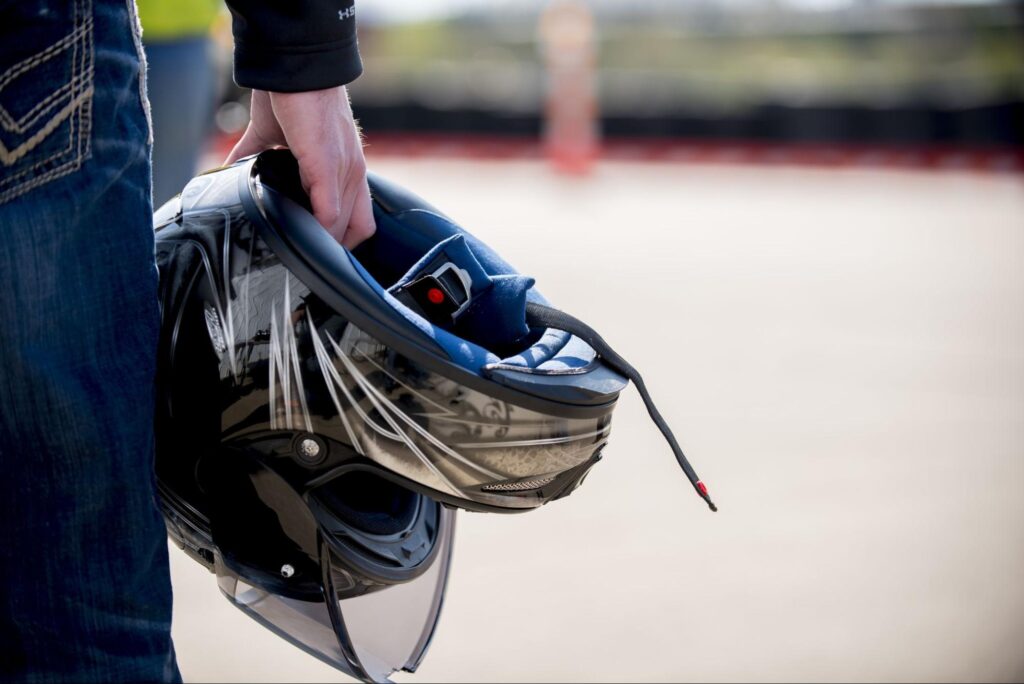
Motorcycle safety is a critical concern, and Georgia has helmet laws to protect riders from severe injuries in accidents. Georgia requires all motorcyclists to wear helmets, regardless of age or experience.
This article will cover the importance of helmet laws, the specifics of Georgia’s regulations, and the legal consequences for not complying. Understanding these laws helps ensure safer riding for all.
Understanding the Importance of Helmet Laws
Motorcycle helmet laws are critical to promoting road safety and protecting motorcyclists. Helmets are the most effective means of preventing severe head injuries in an accident.
Numerous studies have consistently shown the life-saving benefits of wearing a helmet. Research reveals that helmets reduce the risk of head injuries by 85%, brain injuries by 88%, and severe brain injuries by at least 75%.
This stark statistic underscores the life-saving potential of helmets and the vital role they play in reducing the severity of injuries sustained during motorcycle accidents.
Helmet laws are important beyond individual safety. They contribute to public health by reducing hospital costs related to motorcycle injuries. When individuals wear helmets, the likelihood of requiring long-term medical care is markedly decreased.
This, in turn, lessens the financial burden on healthcare systems and society as a whole. Furthermore, helmet laws’ economic impact extends beyond immediate healthcare costs; it encompasses lost productivity due to injuries, rehabilitation expenses, and the emotional toll on families affected by motorcycle accidents.
By enforcing helmet laws, states can foster a culture of safety that ultimately benefits everyone on the road.
The Role of Helmets in Road Safety
Accidents can happen to anyone, and the consequences can be dire. According to numerous safety organizations, wearing a helmet reduces the risk of fatal injuries by about 37%. In addition, helmets can greatly decrease the severity of non-fatal injuries. This statistic is particularly alarming given the increasing number of motorcyclists on the road.
As motorcycle popularity rises, so does the need for effective safety measures. Helmet usage not only protects riders but also reminds all road users about the importance of safety gear, potentially influencing more cautious driving behaviors among motorcyclists and motorists alike.
Moreover, helmets protect the head and provide other safety benefits. They improve visibility and can reduce the impact of wind, rain, and debris, which are all crucial in maintaining focus while riding.
Many modern helmets have features such as built-in visors and reflective materials, which enhance visibility in low-light conditions. Therefore, their role in road safety cannot be overstated.
Additionally, the psychological aspect of wearing a helmet can instill a greater sense of responsibility in riders, encouraging them to adopt safer riding practices overall.
The Legal Perspective on Helmet Usage
The legal framework around helmet laws aims to enhance public safety while balancing personal freedoms. The law in Georgia mandates that all motorcyclists wear helmets while riding. However, the specifics of these laws can vary significantly from state to state across the United States.
Some states have enacted universal helmet laws, while others have more lenient regulations that allow experienced riders to forgo helmets under certain conditions. This patchwork of laws can create confusion for motorcyclists traveling across state lines, highlighting the need for a more standardized approach to helmet legislation.
Legal requirements often spark debates around the concept of personal choice versus public safety. Advocates for helmet laws argue that while personal freedom is essential, public safety must precede life-threatening activities like motorcycling.
Opponents of mandatory helmet laws often cite personal responsibility and the right to make individual choices regarding safety.
This ongoing debate raises questions about the role of government in regulating personal behavior and whether the potential reduction in injuries and fatalities justifies the imposition of such laws.
As discussions continue, it remains crucial to consider the broader implications of helmet laws for community health and safety and riders’ responsibility to protect themselves and others on the road.
The Specifics of Georgia’s Helmet Laws

Georgia’s motorcycle helmet laws are relatively straightforward. They focus on minimizing risk to all riders and require the use of helmets for all motorcycle operators and passengers. These regulations ensure that safety standards are met uniformly across the state.
Compliance with the law enhances safety and is also a legal obligation for motorcyclists in Georgia. Understanding these laws’ details is essential for anyone considering taking to the roads on two wheels.
Age and Helmet Requirements
Georgia’s helmet laws stipulate that all riders must wear a helmet regardless of age. This inclusive approach aims to protect everyone on the road and highlights a commitment to road safety. Age-specific laws, such as those seen in other states, are not applicable in Georgia, which takes a more universal stance on helmet usage.
By mandating helmets for all motorcyclists, the state acknowledges that the risk of accidents does not discriminate based on age or riding experience. This helps create a safer riding environment for both novice and seasoned riders.
The law also reminds people that while riding a motorcycle is exhilarating, it carries inherent risks that necessitate protective measures.
In addition to helmets, riders are encouraged to wear protective clothing, such as jackets and gloves, which can further reduce the severity of injuries in the event of an accident.
Helmet Standards and Specifications
In Georgia, helmets must meet specific safety standards to be considered legal. The state recognizes helmets that are approved by the Department of Transportation (DOT) as meeting the necessary safety specifications. This ensures that the helmets worn by riders offer maximum protection and efficacy.
Motorcyclists should pay attention to helmet certification labels when purchasing gear. Helmets also come in various styles, including full-face, modular, open-face, and half helmets, each catering to different preferences and levels of protection.
Full-face helmets provide the most coverage, protecting the entire head and face, while open-face helmets offer a more relaxed riding experience but leave the face exposed. Additionally, riders should consider the importance of fit and comfort, as a well-fitted helmet is crucial for effective protection.
Proper ventilation and weight can also enhance the riding experience, making longer trips more enjoyable while ensuring safety remains a top priority.
Penalties for Non-Compliance with Helmet Laws
Failure to comply with helmet laws can result in severe penalties in Georgia. Riders caught without a proper helmet may face fines, which can escalate with repeated offenses. Understanding the repercussions is essential for all motorcyclists who wish to navigate the roads legally and safely.
Besides financial penalties, non-compliance can lead to other consequences, including an increased risk of injury, potential complications in insurance claims, and potential liability in the event of an accident.
The importance of wearing a helmet cannot be overstated, as studies have shown that helmets significantly reduce the risk of severe head injuries in motorcycle accidents. This affects the rider’s health and has broader implications for public health and safety.
Fines and Legal Consequences
Although the specific fines for riding without a helmet can vary, they typically range from $25 to $50 for a first offense. Subsequent violations may incur heftier fines.
Riders must be aware of these legal implications to avoid unnecessary financial strain. In some cases, riders may also receive points on their driving record, which can lead to further penalties, including license suspension, if too many points accumulate.
Additionally, if a motorcyclist is involved in an accident while not wearing a helmet, they could face more substantial legal consequences, including diminished claims against other drivers due to shared responsibility in the accident.
This principle of comparative negligence can significantly impact the outcome of legal proceedings, making it vital for riders to adhere to helmet laws for their safety and their legal protection.
Impact on Insurance Premiums
Not wearing a helmet doesn’t just lead to legal issues; it can also affect insurance premiums. Insurance companies may increase premiums for riders with a history of non-compliance with helmet laws, as they are considered higher risk.
This can put a significant financial burden on repeat offenders. Furthermore, insurance companies often require riders to provide proof of compliance with safety regulations, including helmet laws, when assessing coverage options.
Moreover, in the event of an accident, lack of helmet usage may reduce the compensation received from insurance settlements. Insurers view compliance with helmet laws as a factor in assessing risk, making it crucial for riders to comply to maintain reasonable rates.
Additionally, riders who have been involved in accidents without helmets may find themselves in a difficult position when trying to negotiate settlements, as their lack of protective gear can be used against them in discussions about liability and damages.
This underscores the importance of following the law and prioritizing personal safety on the road.
Debates Surrounding Helmet Laws in Georgia

The helmet law in Georgia has been a subject of extensive debate, influencing public opinion. While there are passionate advocates on both sides, the core of the conversation often revolves around safety, personal freedom, and responsibility.
Opponents of helmet laws argue that adults should have the freedom to make their own choices, including whether or not to wear a helmet. They posit that mandatory helmet laws infringe on personal liberties and that education about safety should be the priority rather than legal enforcement.
Arguments for Helmet Laws
Proponents of helmet laws emphasize the undeniable safety benefits that helmets provide. They cite statistics that correlate helmet use with lower rates of severe injuries and deaths in motorcyclists.
According to studies, states with strict helmet laws experience significantly fewer fatalities than those without.
Furthermore, advocates argue that mandatory helmet use raises awareness about motorcycle safety and encourages more responsible riding habits among motorcyclists. They contend that consistency in safety regulations is crucial for road safety.
In addition, they often highlight the financial implications of motorcycle accidents, noting that severe injuries can lead to significant medical costs that ultimately burden taxpayers and the healthcare system.
Arguments against Helmet Laws
Conversely, those against helmet laws often emphasize personal autonomy. They claim that individuals should have the right to choose what risks they are willing to take.
They argue that many motorcyclists are experienced enough to make informed decisions without government intervention.
Moreover, some point out that states should focus on broadening overall motorcycle safety education rather than implementing strict laws. They believe this would achieve higher safety levels without infringing on personal choice.
They also argue that a one-size-fits-all approach does not take into account the varying levels of experience among riders, suggesting that more tailored educational programs could better serve the diverse motorcycling community.
Additionally, they contend that personal responsibility should be emphasized, allowing riders to learn from their experiences and make choices that suit their riding styles and environments.
How Georgia’s Helmet Laws Compare Nationally
Understanding how Georgia’s helmet laws compare to national standards reveals a complex landscape. While many states have similar mandates, others take more lenient approaches, creating disparities across the country.
Georgia stands out for its strict enforcement of helmet usage for all riders, contrasting sharply with states that only require helmets for younger or novice motorcyclists. This can create confusion for riders traveling across state lines, especially for those who may be unaware of the differing regulations.
Riders must remain vigilant and informed, as failing to adhere to local laws can result in fines or, more critically, increased risk of injury in the event of an accident.
Strictness of Georgia’s Laws in a National Context
Georgia’s approach is more stringent compared to states like Florida or California, which have more relaxed helmet laws. This strict enforcement is a reflection of the state’s commitment to rider safety and public health.
The rationale behind such laws is supported by numerous studies indicating that helmet use significantly reduces the severity of head injuries in motorcycle accidents. As a result, Georgia’s laws aim to protect individual riders and alleviate the broader public health burden associated with motorcycle-related injuries.
Motorcyclists should understand their local laws and the legal environment of any state they may travel to. This will ensure that they comply with the regulations of each jurisdiction they pass through.
Additionally, understanding these laws can enhance a rider’s overall safety strategy, helping them better prepare for the risks associated with riding in different environments and conditions.
States with Similar and Dissimilar Laws
A few states have laws that align closely with Georgia’s helmet regulations, such as Alabama and Louisiana, which require helmets regardless of age or experience. In contrast, states like Illinois and New Hampshire have no mandatory helmet-use laws at all.
This lack of uniformity can lead to significant differences in rider safety outcomes, as states with stringent helmet laws often report lower rates of fatalities and serious injuries among motorcyclists.
This variance highlights the ongoing debate regarding motorcycle safety, personal freedom, and state responsibility. Those considering motorcycling should keep in mind the legal implications and safety recommendations of the states they plan to ride in.
Furthermore, the conversation around helmet laws often extends beyond legal requirements; it encompasses broader discussions about rider education, the importance of protective gear, and the role of community awareness in promoting safer riding practices.
Engaging with local motorcycle clubs or safety organizations can provide valuable insights and resources for riders looking to navigate these complex regulations effectively.
Conclusion
Georgia’s motorcycle helmet laws aim to protect both riders and the general public by ensuring everyone on the road wears a helmet. While these laws have sparked debates over personal freedom versus safety, the overwhelming evidence favoring helmet use for reducing injuries and fatalities cannot be overlooked.
Understanding these laws and their implications can help motorcyclists make informed decisions and raise awareness about the importance of safety gear. Ultimately, responsible riding practices contribute to individual rider safety and the broader commitment to road safety for all individuals.
Involved in a motorcycle accident or unsure about your legal rights under Georgia’s helmet laws? The experienced team at Howe Law is here to help. Contact us anytime at 888-559-7033 for a free consultation available 24/7, or visit our website at Howe Law to learn more.
Protecting your rights is our priority!
Related Articles


























































